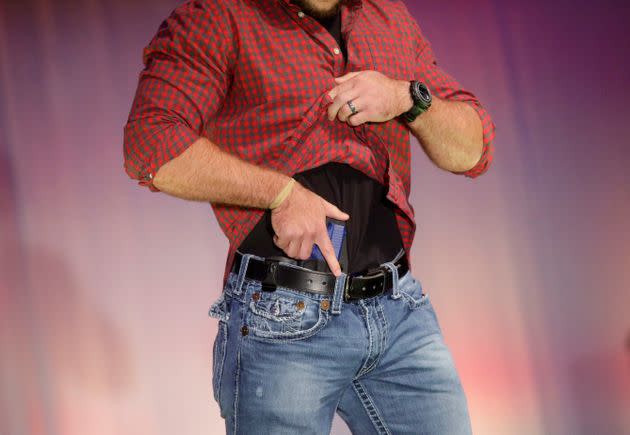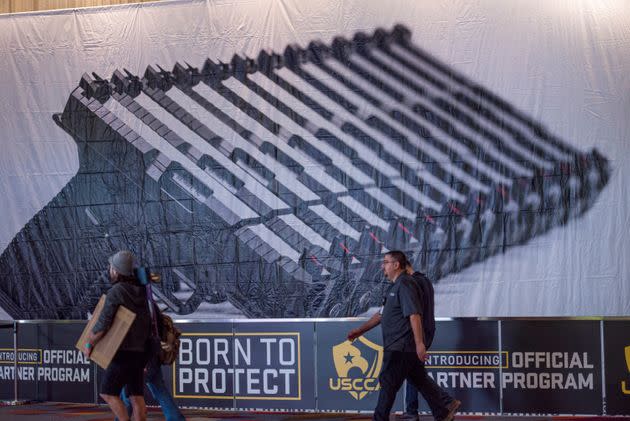People Can Now Carry Guns Without A License In Half Of America's States
Alabamians woke up Sunday with the right to carry a gun without a license.
The change, implemented by a state law passed last year, marked a major milestone: half of America’s 50 states now allow people to carry handguns without first seeking a permit.
Thirteen years ago, only two states — Vermont and Alaska — allowed its residents the unfettered right to carry a gun, relying on the Constitution’s Second Amendment as a blanket permit for all.
Since 2010, however, nearly two dozen states have followed suit, with 11 of them passing permitless carry laws in the last three years alone.
The growing movement has chalked up wins in state legislatures with remarkable speed, drawing cheers from gun rights advocates while raising fears among reformers that the changes will lead to more guns in the street — and likely more violence.

A model walks the runway during the NRA Concealed Carry Fashion Show on Friday, Aug. 25, 2017, in Milwaukee, Wisconsin. Half of America’s 50 states now allow people to carry handguns without first seeking a permit.
“If you are a law-abiding citizen, you should fully be able to exercise all of your constitutional rights,” said Andi Turner, legislative director for the Texas Rifle Association.“Half the states of the union are now recognizing it.”
Permit systems generally require applicants to demonstrate safe gun handling, as well as show knowledge of often-complicated gun laws and the use of lethal force.
“We’ve seen in the past decade a very concerted effort by the corporate gun lobby, especially the NRA,” said Nick Wilson, a gun violence researcher at the Center for American Progress. “It has been a very successful campaign for the gun lobby. It helps their bottom line. … But it’s very concerning to anyone worried about public safety.”
The state legal changes have dovetailed with two other trends that augur well for gun advocates. First, the COVID-19 pandemic unleashed an unprecedented surge in sales. And second, people of color and women made up a larger share of the buyers, diversifying a gun-buying public that has traditionally skewed male, white and conservative.
Gun violence has also spiked since the pandemic began, with firearm deaths jumping 20% from 2019 to 2021, according to a recent study published by JAMA Network Open.
With big-ticket gun reforms like the Assault Weapons Ban or universal background checks stalled in Congress, the spate of state laws marks a defeat for the reform movement, which views the trend as a public security threat.
Sociological studies tend to show that increases in gun ownership generally track with increases in violence.
“It’s no coincidence that in states with very permissive approaches to guns in public, you have higher rates of gun death,” said Adam Skaggs, chief counsel for the Giffords Law Center, a nonpartisan reform group.
Over the last five years, researchers have increasingly shown that loosening restrictions on carrying handguns is also associated with problems like increased gun theft and road rage incidents, according to Stanford Law professor John Donohue.
Letting more people carry guns also impedes police work, Donohue said – partly from upticks in their caseloads of gun thefts and accidental shootings and partly because ramping up the risk of getting shot reduces police efficiency.
“One of the unintended consequences of putting more guns on the street is degrading police performance,” Donohue said. “You see clearance rates for all crimes drop when states move in the direction of letting more people carry guns.”
Tallying the number of states with permitless carry laws can exaggerate their reach, Skaggs noted. They tend to be small states with rural populations, while larger, more urban states like California and New York tend to favor a more restrictive approach toward firearms.
Just over one-third of Americans live in the 25 states embracing permitless carry.

This photo taken Monday, Jan. 20, 2020, shows a sign advertising the U.S. Concealed Carry Association, which advocates on behalf of gun owners' rights to carry firearms concealed, on display at SHOT Show, the annual trade show for the gun industry in Las Vegas.
And in the same way that gun rights groups have made speedy progress with permitless carry laws in red states, liberal-dominated legislatures have pushed opposing measures.
New York tightened its gun restrictions after last year’s mass shooting in Buffalo.Delaware enacted a state-level Assault Weapons Ban last year.A ballot measure passed last year by Oregon voters requires a permit for all gun purchases and restricts magazines that hold more than 10 rounds, though the law is tied up in the courts.
But the conservative-stacked Supreme Court’s landmark decision in the New York State Rifle and Pistol Co. v. Bruen case last year has also made it harder for state legislatures to keep people from carrying handguns. The ruling struck down a New York law that required applicants for concealed handgun licenses to demonstrate a specific need for carrying a weapon.
The ruling stopped short of scrapping permits for carrying handguns altogether, however.
“The opinion made very clear that there’s nothing in the Constitution that requires permitless carry,” Skaggs said. “’Constitutional carry may sound good with its alliteration and the way it rolls off the tongue, but it’s fundamentally untrue and misleading. Guns in public have always been significantly regulated.”
Still, the Bruen decision could have major impacts on state-level gun debates, according to Mark Oliva, spokesman for the National Shooting Sports Foundation, the firearm industry trade group.
“Left-leaning and right-leaning states will probably become more polarized,” Oliva said. “And you’re going to keep seeing them go to the courts and say, ‘what’s the truth here?’ And if the truth follows what came out of Bruen, they’re going to find assault weapons bans are unconstitutional, magazine restrictions are unconstitutional, age restrictions and background checks for ammunition purchases are unconstitutional.”
States with permitless carry could become the majority before the year’s end.
Virginia Delegate Marie March (R) pre-filed a constitutional carry bill in November for this year’s legislative session. However, Florida Gov. Ron DeSantis wants the issue prioritized when Florida lawmakers reconvene in April.
In Nebraska, a permitless carry bill failed to break the threshold for overcoming a filibuster in the state Senate last year by two votes. Nebraska Gov. Pete Ricketts (R) plans to try again this year.
